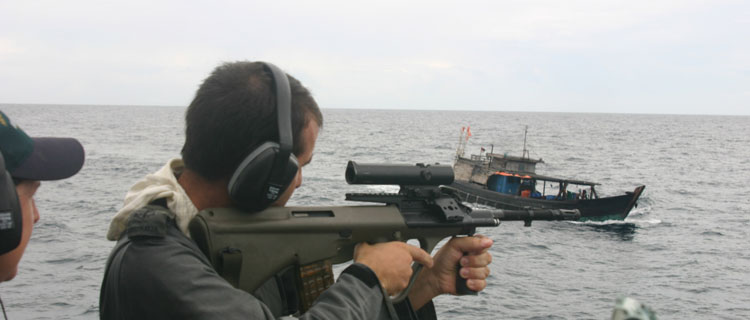
See animation describing how the illegal fisheries in the Antarctic has been reduced over the years.
Southern Ocean illegal fishing
A southern comfort
How adaptive governance helped pull back illegal fishing in the Southern Ocean
- Study analyses the international governance systems that has developed around illegal fishing in the Southern Ocean
- Describes how the Commission for the Conservation of
Antarctic Marine Living Resources (CCAMLR) became an effective institution for dealing with the crisis - Study presents four governance features important for mobilizing efforts
That overfishing has historically caused widespread stock collapses in the Southern Ocean is well known. But illegal, unreported and unregulated (IUU) fishing has also threatened to clear some of the remaining fish stocks in the region. Thanks to 15 years of an international collaborative effort, however, IUU has been substantially reduced.
Four features of governance
In a recently published article in Ecology and Society, centre researcher Henrik Österblom, together with science director Carl Folke provide a synthesis of the international governance systems that has developed around IUU fishing in the Southern Ocean.
They describe in detail how the Commission for the Conservation of Antarctic Marine Living Resources (CCAMLR) went from zero to hero and developed into an effective international institution for dealing with the fisheries crisis. Official estimates suggest that unsustainable and illegal fishing has been reduced to less than ten percent of former levels.
In their study, Österblom and Folke analyse how four features of governance: actors, networks, organisations and institutions contributed to the effectiveness of CCAMLR. In combination with similar studies on the emergence of robust governance structures elsewhere, they are able to show how adaptive governance has emerged at a global scale and improved the management of regional, marine ecosystem services.
"Based on qualitative interviews, quantitative social network and survey data, and literature reviews, we describe how individuals, by mobilizing social networks, formalizing cooperation, and integrating novel formal and informal rules create an adaptive governance system that enables complex problem solving," Österblom explains.
Request publication
The CCAMLR case
The Commission for the Conservation of Antarctic Marine Living Resources (CCAMLR) was established in 1983 and is a forum for international collaboration between states, but non-state actors are also included in national delegations and as independent observers. Although CCAMLR existed before the emergence of well-documented IUU fishing in the mid 1990s, it did not evolve into a well-functioning institution that could deal with the problem.
"Initially, CCAMLR was unable to address IUU fishing effectively because it lacked knowledge and adequate compliance mechanisms," Österblom says.
"Instead, it served as a platform in which informal actors and networks were able to organize and contribute to a more effective institution that could really deal with IUU fishing."
How it all started
It started with an individual from a small NGO in Norway who managed to secure funding to investigate the actors involved in IUU.
At the same time, NGOs and fishing industry representatives in the Australian delegation to CCAMLR realized that IUU fishing posed a significant threat to both fish stocks and vulnerable seabirds. Norwegian and Australian initiatives connected actors from the NGO community with key actors in the fishing industry, which led to a rapid increase in information exchange and collaboration. Put in another way, individual actors were able to connect with like-minded individuals, which lead to the emergence of informal social networks aimed at reducing illegal fishing.
From there a new organization called ISOFISH was launched which carried out research for describing actors, vessels, ports and countries involved in IUU fishing. This not only provided CCAMLR with new information but also reinvigorated CCAMLR's position and mandate to exercise social and political pressure in the region.
In 1999 ISOFISH was closed down but the fight to curb IUU fishing was now so established that other actors could take over. Several networks and organisations continued in their quest to curb IUU fishing.
Adequate incentives to act
Over the following years, CCAMLR's position grew stronger and both information sharing and monitoring increased significantly, largely thanks to the combination of informal and formal networks.
"Informal and formal networks have been instrumental to the successful outcomes of CCAMLR and this case study is an example of how key actors, networks, organizations and institutions interact and mobilize the necessary capacity to address complex challenges. The goals for such cooperation appear to have been sufficiently clear, the threats sufficiently imminent, providing strong interests among stakeholders to engage. Combined they become adequate incentives to act," Österblom says.
The study concludes that the four features of governance described for the CCAMLR case study, starting from individual actors, to informal social networks, establishment of targeted organizations, which later becomes part of existing formal institutions, may represent a more general way in which governance efforts are mobilized.
references
Österblom, H., and C. Folke. 2013. Emergence of global adaptive governance for stewardship of regional marine resources. Ecology and Society 18(2): 4. http://dx.doi.org/10.5751/ES-05373-180204
Henrik Österblom has a background in marine ecology and also in working for the Swedish Ministry of Environment. His research focuses on food-web interactions, trophic cascades and ecosystem regime shifts, as well as governance of marine resources.
Professor Carl Folke is Science Director of the Stockholm Resilience Centre. He has extensive experience in transdisciplinary collaboration between natural and social scientists, and has worked with ecosystem dynamics and services as well as the social and economic dimension of ecosystem management and proactive measures to manage resilience.
Phone: +468 16 2000
Organisation number: 202100-3062
VAT No: SE202100306201






